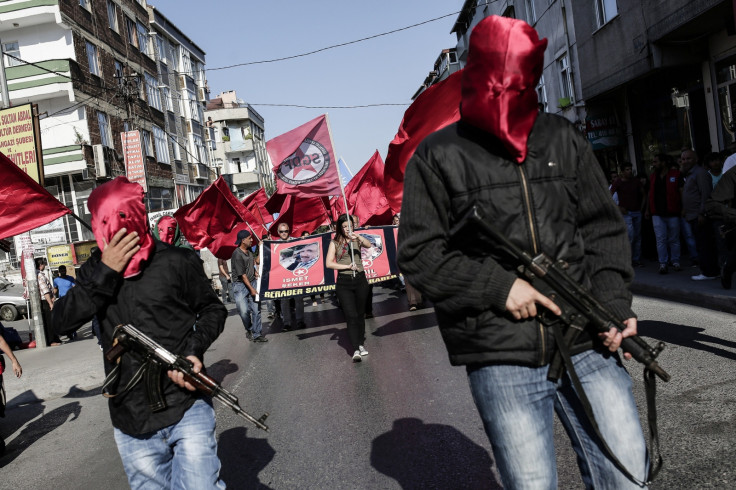Turkey: More riots rage in Marxist Gazi stronghold after death of female activist Günay Özaslan

Turkish police were battling masked rioters on the streets of the restive district of Gazi in Istanbul on Sunday 26 July as riots stretched into a second day.
Journalists and activists on the scene posted videos and photographs of protesters hurling petrol bombs and rocks at riot police, who fired back with water-cannon and tear gas.
Gazi is a ultra-left wing district of Istanbul with a history of political activism and a stronghold of the outlawed Revolutionary People's Liberation Party - Front (DHKP - C).
The protests come after a massive anti-terror crackdown by the Turkish authorities that follows an Islamic State suicide bombing in Suruc earlier this week.
A police raid on Friday 24 July saw the death of Günay Özaslan, a DHKP-C activist in a shoot-out in the district.
Turkish media on the ground reported multiple clashes between protesters and police, with reports that at least one journalist had been injured.
Cenaze hala cemevinde. Gazi mahallesi halk çatışmaya devam ediyor. @mbirligi @DOBirligi pic.twitter.com/JRmqZQAK9k
— Pınar (@ekinn_su) July 26, 2015
Gazi Mahallesi'nde neler oluyor polis müdehalesi bir kişi kafasından vuruldu Gazi Mahallesi eylemi CANLI İZLE http://t.co/u8NzxznFNM
— Mehmet Sefa Akyıldız (@MSefaAkyldz) July 26, 2015
#GaziFaşizmeMezarOlacak Akp'nin Polisleri,Özel Harekatçıları Gazi'de Katliam YapmayaHazırlanıyor!Tüm Halkımız Gazi'ye pic.twitter.com/XeHBS6dU6Q
— Halkın Sesi TV (@halkinsesitv_) July 26, 2015
Gazi'de polisin attığı gaz fişeği sonucu DİHA muhabiri bacağından yaralandı. #GaziFaşizmeMezarOlacak pic.twitter.com/9Noroihczw
— Halit Demir (@halitdemir21) July 26, 2015
Gazi is a restive working-class community with a history of anti-government activism. In 1995, four days of riots saw 23 people killed and thousands injured in some of the worst street violence Istanbul had seen for decades.
Critics have argued that Turkey's arrest of over 1,000 political dissidents across the ideological spectrum is a cynical exploitation of the bombing in Suruc.
Many feel that Turkey has aided Islamic State, believed to be responsible for the attack, by failing to secure its border with Syria and allowing foreign fighters and weapons to flow in to the country.
Turkey's bombing of Kurdistan Workers Party (PKK) camps in northern Iraq on Saturday 25 July has also provoked anger with the government given that the PKK and its Syrian arm, the YPG, is one of the only forces in Syria mounting a credible opposition to IS.
As a result of President Reccip Tayip Erdogan's increasingly divisive rule of the country, many left wing Turks have gravitated towards Kurdish parties including the HDP, which secured a history 13% of the vote in elections earlier this year.
© Copyright IBTimes 2024. All rights reserved.







